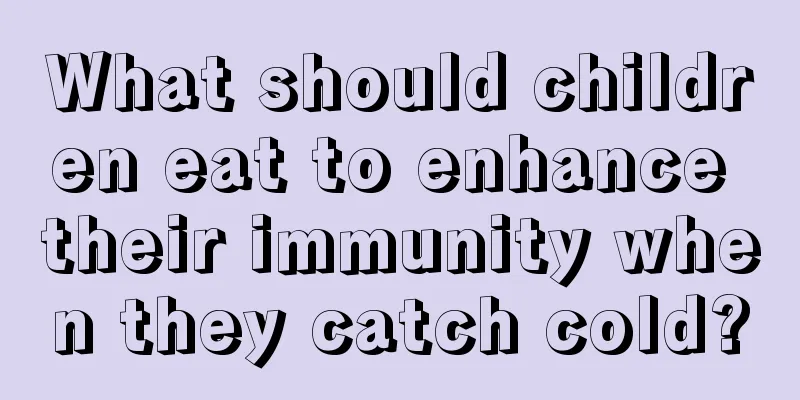What should I do if my newborn always chokes when drinking water? How can I drink water correctly?

|
Newborn babies' swallowing movements are not well coordinated, so they can choke easily. Everyone's swallowing movements seem simple, but they are actually very complicated. This is also a learning process for him. Therefore, no matter whether feeding water or milk, we must pay more attention to the baby's movements. If the baby chokes on water, it will cause the baby to cough constantly and have tracheal discomfort. In severe cases, it may enter the lungs and cause pneumonia. If the baby chokes while drinking water, he should be laid prone on the adult's lap or bed, and his back should be patted hard to make him cough it out. If your baby vomits due to coughing, you should quickly turn his face to one side to prevent the vomit from flowing back into the throat and trachea. Then wrap a handkerchief around your finger and put it into the mouth and even the throat to quickly clean out the vomited, spilled milk and food to keep the baby's respiratory tract smooth. Then use a small cotton swab to clean the baby's nostrils to avoid respiratory blockage. The opening of the esophagus and the opening of the trachea are connected in the throat. If a large amount of water is choked on, it will cause tracheal obstruction and inability to breathe, or it will be directly inhaled deep into the lungs and cause aspiration pneumonia. Therefore, parents should pay attention to feeding their babies water: 1. The opening of the pacifier should not be too big. If the baby often bites the opening of the pacifier, the opening will become bigger and bigger. The bigger the mouth, the faster the water will flow, and the baby will easily choke. You can try turning the bottle upside down before feeding. 2. Use a suitable posture for feeding water. Try to hold your baby up when feeding water. Let the baby's body be tilted at about 45 degrees. The water in the stomach will naturally flow into the small intestine. This will reduce the chance of choking compared to feeding water while lying down. If the baby still chokes, don't put the nipple too straight in the baby's mouth, but a little to the left or right. This way the baby will eat slower, but the water will not rush directly into the trachea, so the baby will not choke. 3. When feeding your baby water, the speed must be controlled appropriately. It is better to go slowly than to be too impatient. Some parents will blame it on the baby swallowing too quickly, but the bottle is in the parents' hands, and the parents can influence the baby's sucking speed by controlling the in and out of the bottle and the size of the nipple hole. 4. Don’t let your baby drink water with his head tilted back. 5. If you are feeding with a spoon, scoop a little at a time and feed more often. 6. When infants and young children are crying, breathing rapidly, or wheezing, they may easily choke when eating, so avoid letting your baby eat while crying. 7. Don’t tease your baby when he is drinking water. He would choke when he laughed and drank. 8. After the baby finishes drinking water, stand him up and pat his back until he burps. 9. Sudden or repeated choking may cause severe aspiration pneumonia. This may also be due to problems with the oropharynx. It is best to take your baby to a pediatrician for a thorough examination. |
<<: Why do newborns peel and how to care for them
>>: What is the cause of diarrhea and yellow water in newborns and how to care for them
Recommend
What to do if a child has cough and bronchitis
Some young children suffer from serious bronchiti...
8-month-old baby development standard
New mothers are still relatively unskilled in tak...
Children's flatulence symptoms
Bloating is a condition that many children will e...
Is it dangerous to slap a child in the face?
Many parents have the experience of slapping thei...
The reason why children refuse to eat breast milk is because of these reasons
Because of physical discomfort or physiological p...
What should I do if children have nail ulcers?
Paronychia is when a fingernail or toenail become...
What are the signs of hand, foot and mouth disease?
The incidence of hand, foot and mouth disease in ...
What is the reason for the child's persistent high fever? The inflammation in the body needs to be eliminated
A mother's biggest fear is that her child wil...
Newborn baby tears and eye mucus
If a newborn baby sheds tears, you must pay atten...
Why does a child have a viral infection and cough?
As the saying goes, every child has nine coughs. ...
What fruits can babies with fever eat?
Every parent hopes that their child can grow up h...
Private care for newborn baby girls
Does a baby girl need to have her private parts c...
What can children eat to improve their brain and memory?
Children are under great academic and competitive...
What is the reason for children coughing in the early morning?
Coughing is a very common disease in life. Someti...
Developmental standards for eight and a half month old babies
Babies aged eight and a half months cannot speak ...









